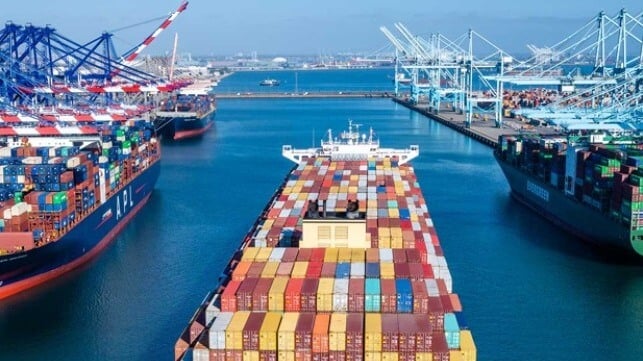FMC Supply Chain Fact Finding Calls for New Rules and Investigations

Federal Maritime Commissioner Rebecca Dye Tuesday issued to the Commission her Final Report in Fact Finding 29, an investigation of COVID related impacts to the supply chain, finding that while competition remains “vigorous” among the ocean carriers more needs to be done to address skyrocketing costs including demurrage and detention, and that specific actions are needed to create stronger agreements between the carriers and shippers. In a 65-page report, a broad set of recommendations is offered to address the complaints of shippers and the function of the global supply chain.
Fact Finding 29 was launched in March 2020 focusing on the global supply chain shortly after the pandemic was declared. The two-year investigation incorporated input from stakeholders across the supply chain ranging from the shipping companies to importers and exporters. The focus and issues evolved over the two years with the commissioner focusing on three widely discussed concerns regarding the price of shipping, the fees being charged to shippers, and the bottlenecks in the supply chain.
The report highlights the increased concentration of shipping activity, the decline of the number of competitors, and the growth of the three major carrier alliances, but concludes that there is no specific evidence of a violation of regulations. The FMC concludes that “the current market for ocean liner services in the Trans-Pacific trade is not concentrated and the Trans-Atlantic trade is only minimally concentrated.” This is diametrically opposed to both the U.S. Congress and President Biden that attributed many of the problems and cost increases to the three alliances and a lack of competition.
“The historically high freight rates experienced recently by U.S. exporters and importers have been devastating to many, but I want to emphasize that the commission has done its job during the COVID-19 pandemic to enforce our competition authority,” says Commissioner Dye. “Our markets are competitive and the high ocean freight rates have been determined by unprecedented consumer demand, primarily in the United States, that overwhelmed the supply of vessel capacity. Congestion further constrained available capacity.”
The report however highlights a concern that carriers are not in full compliance with the FMC’s rulings on D&D fees. They acknowledge the vocal complaints of the shipping community saying “the Commission has moved forward on enforcement of the Interpretive Rule on Detention and Demurrage and ensuring compliance by carriers with the ‘incentive principle’ embodied in the rule.” Despite that several recommendations, including a call for a commission Investigation into practices relating to the numerous charges assessed by ocean common carriers, seaports, and marine terminals, focus on the tariffs shippers are experiencing. They also call for rule making to address issues including earliest return date and empty container return practices.
The findings also call for a better relationship and more defined contracts between the carriers and shippers. Commissioner Dye reports concerns that the current freight contracts are not enforceable commercial documents and lack the mutual understanding between the carriers and shippers.
Among the other recommendations is an identified need for an FMC compliance officer at the major shipping companies as well as the FMC continuing its audit program and adding dedicated staff focusing on the international supply chain. It should also be supported by additional outreach programs to the shippers and continued cooperation with other agencies including the Department of Agriculture.
Despite these efforts, the investigation concluded that the FMC may lack the regulatory tools to deal with numerous new charges imposed on U.S. shippers and truckers by ocean carriers and marine terminals. Several of the recommendations seek to address these issues, while the U.S. Congress also continues to have reform of the Ocean Shipping Act on its agenda. The House and Senate need to reconcile different versions of the bill before it can proceed to President Biden who is expected to support the legislation.

that matters most
Get the latest maritime news delivered to your inbox daily.
“Commissioner Dye’s work leading this Fact Finding investigation has been invaluable in determining ways the FMC can best assist importers and exporters to manage the supply chain challenges linked with the COVID-19 pandemic,” said FMC Chairman Daniel Maffei. He noted that the full commission would begin their effort to review and implement the recommendations from Fact Finding 29.
This is the second set of recommendations arising out of Fact Finding 29. In July 2021, Commissioner Dye presented eight Interim Recommendations, with the commission implementing all the recommendations that did not require legislative action.
